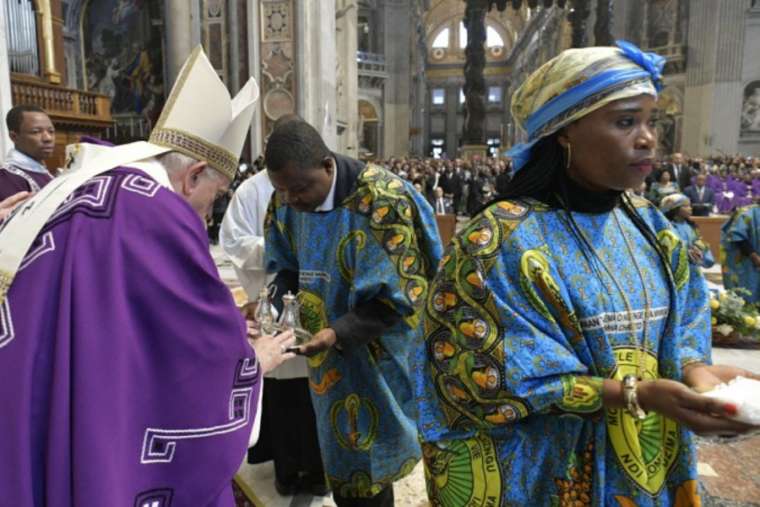Pope Francis celebrates Mass according to the Zaire Use at St. Peter’s Basilica on Dec. 1, 2019. Credit; Vatican Media.
Pope Francis said yesterday that inculturated liturgy can teach Catholics to better appreciate the diverse gifts of the Holy Spirit.
In a preface to a new book, Pope Francis said “this process of liturgical inculturation in Congo is an invitation to value the various gifts of the Holy Spirit, which are a treasure for all humanity.”
A year ago, Pope Francis offered Mass in St. Peter’s Basilica for Congolese immigrants, marking the 25th anniversary of the foundation of the Congolese Catholic Chaplaincy of Rome.
The inculturated Mass included traditional Congolese music and the Zaire Use of the Ordinary Form of the Roman Rite.
The Zaire Use is an inculturated Mass formally approved in 1988 for the dioceses of what was then known as the Republic of Zaire, now called the Democratic Republic of the Congo, in central Africa.
The only inculturated Eucharistic celebration approved after the Second Vatican Council, it was developed following a call for adaptation of the liturgy in “Sacrosanctum concilium,” Vatican II’s Constitution on the Sacred Liturgy.
“One of the main contributions of the Second Vatican Council was precisely that of proposing norms for adapting to the disposition and traditions of various peoples,” the pope said in a video message published yesterday.
“The experience of the Congolese rite of the celebration of Mass can serve as an example and model for other cultures,” the pope said.
He urged the bishops of Congo, as St. Pope John Paul II did during the bishops’ visit to Rome in 1988, to complete the rite by also adapting the other sacraments and sacramentals.
The pope sent the video message in advance of the Vatican’s publication of the Italian-language book “Pope Francis and the ‘Roman Missal for the Dioceses of Zaire.’”
Francis said that the subtitle, “A Promising Rite for Other Cultures,” “indicates the fundamental reason behind this publication: a book that is the testimony of a celebration lived with faith and joy.”
He recalled a line from his post-synodal apostolic exhortation “Querida Amazonia,” published in February, in which he said that “we can take up into the liturgy many elements proper to the experience of indigenous peoples in their contact with nature, and respect native forms of expression in song, dance, rituals, gestures and symbols.”
“The Second Vatican Council called for this effort to inculturate the liturgy among indigenous peoples; over 50 years have passed and we still have far to go along these lines,” he continued, quoting the exhortation.
The new book, which includes a preface by Pope Francis, has contributions from professors at the Pontifical Urbaniana University, a PhD student at the Pontifical Gregorian University, and a journalist from the Vatican newspaper L’Osservatore Romano.
“The spiritual and ecclesial significance and the pastoral purpose of the Eucharistic celebration in the Congolese Rite were the basis of the drafting of the volume,” the pope explained.
“The principles of the need for scientific study, adaptation and active participation in the Liturgy, strongly desired by the Council, have guided the authors of this volume.”
“This publication, dear brothers and sisters, reminds us that the true protagonist of the Congolese Rite is the People of God who sing and praise God, the God of Jesus Christ who saved us,” he concluded.
Source: CNA

